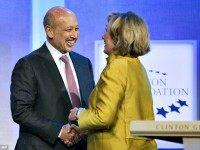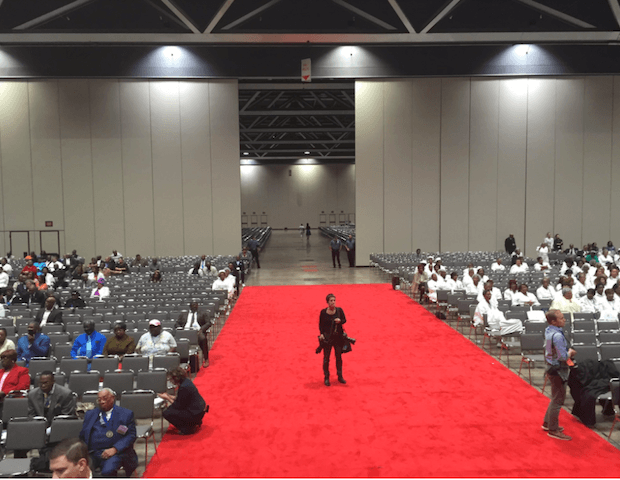Connect THIS, Rusted Brain, and all the rest of you conspiracy laden idiots...
On Friday, Sept. 2, the FBI released a report (
and Part two) on its investigation of Hillary Clinton’s use of email on a private server to conduct government business while she was secretary of state. The report is, in essence, an exoneration of Clinton, with the exception of her record keeping practices, which did not conform with FARA requirements.
The report also provides compelling evidence that supports Clinton’s contention that her answers to the FBI, described by the FBI’s director as truthful, are completely consistent with the public information she has released on the issue. Fact checkers like
gave Clinton four Pinocchios for saying Comey said she was truthful in her answers. And yes, this was a short circuit—Comey could of course be only referring to answers given the FBI by Clinton. As Kessler wrote:
For instance, when Clinton asserts “my answers were truthful,” a campaign aide said she is referring to this statement by Comey to Congress: “We have no basis to conclude she lied to the FBI.”
But that’s not the whole story. When House Oversight Chairman Jason Chaffetz (R-Utah) asked whether Clinton had lied to the American public, Comey dodged: “That’s a question I’m not qualified to answer. I can speak about what she said to the FBI.”
In her now-deemed “not a press conference” before the NABJ/NAHJ convention, Clinton clarified she misspoke (the famous “short circuit” quote). But now we
do have Clinton’s “truthful” answers to the FBI—and we know those answers are completely consistent with Clinton’s public pronouncements on the issues. Clinton was truthful.
Here are the main takeaways:
1) Review of technical details of Clinton use of private server
The FBI report commences with an extensive review of its actions with regard to retrieving the Clinton server and her devices (see pp. 1-9 of the report). Interestingly, the FBI reviewed beyond the last day of Clinton’s tenure as secretary of state, following the Clinton email trail after February 2013. This made sense because Clinton’s emails as secretary of state remained preserved in those records. (This by the way, is one example of why Clinton’s decision was faulty as a matter of record keeping—she needed to turn over the server to the State Department.)
The technical details raise two noteworthy issues. First, if Clinton intended to hide the emails in her possession, why didn’t she immediately give the order to have her server and email accounts deleted? This is precisely what Colin Powell did with his private email account while secretary of state (more on this later). Second, there was no evidence of a hack of the Clinton servers during her tenure as secretary of state and in the period after she left.
2) Colin Powell has been untruthful regarding his discussions with Clinton about use of private email
In response to press accounts detailing his discussions with Hillary Clinton regarding the use of private email as secretary of state, Colin Powell told
People magazine:
Her people have been trying to pin it on me, The truth is, she was using [the private email server] for a year before I sent her a memo telling her what I did
This is a complete falsehood. We know this as a result of the FBI report, which states on page 11 that Clinton exchanged emails with Powell on the subject on Jan. 23, 2009, just two days after Clinton was sworn in as secretary of state. Thus it was not “a year before” as Powell falsely claimed—it was actually before Clinton made the decision to use private email.
What is more remarkable is the advice Powell actually gave Clinton:
Be very careful, I got around [record keeping requirements] by not saying much and not using systems that captured the data.
Think about that. Not only was Powell advising Clinton to evade her record keeping requirements, he actually admitted that he did so himself! Let’s put it this way: If the media could have put Powell’s words in Clinton’s mouth, the impeachment trial would be on as we speak (even before she was elected). But in fact, Clinton did nothing suggested by Powell to evade her record keeping requirement—to the point of
not deleting emails after she left as secretary of state. If this was a criminal enterprise to avoid FARA and FOIA, it sure was an incompetent one.
3) The Bureau of Information Security Management stated there was no prohibition against the use of private emails
On page 11, the FBI report flatly states:
The Bureau of Information Security Management [stated] there was no restriction on the use of personal email accounts for official business.
Thus, Clinton’s use of private email and a private server were
not prohibited.
4) Record preservation
The FBI Report quotes Cheryl Mills as describing the record keeping practice for Clinton as making sure recipients were sent email to their State.gov accounts. As I’ve stated repeatedly, this does not, in my view, meet Clinton’s requirements for record preservation. A better practice would have been to turn over all work-related emails in her email account to the State Department on a periodic basis. Alternatively, Clinton could have opened a State.gov account and copied the account on all of her work correspondence. This is a clear failing by Clinton.
5) Clinton never used any electronic devices in SCIF (top secret) areas
The FBI Report (on page 12) makes clear Clinton
never used any electronic devices in Sensitive Compartments Information Facilities (SCIF.) Clinton also had an SCIF area in her residences in Washington and in New York. it is clear that Clinton never intended and in fact, never did, expose properly marked and identified classified information to nonsecure mediums.
6) Thirteen individuals at state were emailed, or emailed Clinton at her private email
The FBI Report states only 13 individuals had access to the Clinton email network. Page 13 details how Clinton’s network of senders and recipients to her private email account was extremely limited. Just 13 of her top aides had access to her email, as either senders or recipients. This is an important fact to keep in mind when we discuss classified information and leakage into a unsecured email system.
7) Only three emails contained any indications of classified markings; such markings were improperly placed in each instance and two of the three were not classified
What was the FBI investigation supposed to be about? Ostensibly, it was about whether Clinton or anyone at State handled classified information in a manner that rose to criminality. Of course the inquiry was ridiculous on its face. But let’s consider what the upshot was—from page 19 of the FBI report:
The FBI identified 3 email chains, encompassing 8 individual e-mails exchanges, to or from Clinton’s personal e-mail account, which contained at least one paragraph marked (C), a marking ostensibly indicating information classified at the CONFIDENTIAL level [the lowest].
The e-mails contained no additional markings, such as a header or a footer, indicating they were classified. [emphasis added]
Why it matters:
Comey had to admit that Clinton’s actions with regard to those emails were reasonable.
And that was it with regard to documents actually marked classified at the time. That’s the entire “scandal.”
8) To the degree “leakage” of classified information onto unsecured systems is a valid concern, it has nothing to do with Clinton and everything to do with decades-long State Department practices
This is a horse I have beaten to death: Clinton put not one single classified (marked or even argued classified after the fact) document in her emails. Not a single one. Nothing that was put in her emails came from a classified system. Not a single thing! If the State Department’s career officials were sending information on unsecured email for decades that the intelligence community thinks should not have been sent through unsecured channels, this issue is not about Clinton—it is about the State Department and the intelligence community (IC.)
And yet the FBI Report details in pages 22 to 27 that in fact every single document that the IC now claims should have been classified originated from career State Department officials, using the State Department unsecured e-mail system—see “
About Those Top Secret E-mails.”
Clinton reasonably stated that she relied on the expertise and experience of career State officials regarding classification designation. And frankly, the IC definition of classified is in fact a violation of the law—The
Reduce Overclassification Act, signed into law by President Obama in 2010. The intelligence community has blithely broken this law. No one in the media cares.
8) There is no evidence Clinton’s emails or server were hacked
The authors of the report seem especially upset about the fact they could not discover evidence that Clinton’s server and emails were not hacked. (see pages 26 to33 of the FBI report). But that’s the evidence—no hack. Unlike the State Department systems, which have been repeatedly hacked.
In conclusion, the FBI report makes clear that 1) Hillary Clinton has been truthful to the public regarding her statements on E-Ghazi, 2) she acted reasonably when she accepted the classification determinations of senior career State Department officials, 3) that no properly marked classified information was in her private server or email systems, 4) that use of private email or a private server was not prohibited at the time, 5) that Colin Powell was untruthful in his statements regarding his communications with Clinton on the email issue and that 6) there is no evidence Clinton’s emails or server were hacked.
FBI Director Comey’s unprecedented and improper decision to discuss the investigation publicly was wrong and his opinions on carelessness unfounded. Indeed, his recklessness is what is highlighted here.
While there are a couple of stray questions to be resolved (example: Clinton should explain her answer regarding the (C) markings as the FBI Report is rather unclear), what is clear is that the FBI report fully exonerates Clinton not only from criminal charges, but from any charge of carelessness of recklessness with classified information.
Clinton was careless with her record preservation obligations and, in my view, violated those obligations.
But on the rest? Not only is she cleared, she is fully exonerated.
In Part Two, I will review the notes from the FBI’s Clinton interview and attempt to demonstrate that her answers to the FBI fully conform to her public statements on the matter.















